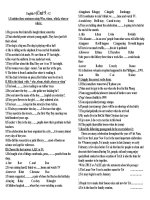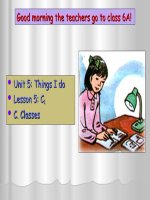Unit 3
Bạn đang xem bản rút gọn của tài liệu. Xem và tải ngay bản đầy đủ của tài liệu tại đây (91.96 KB, 4 trang )
<span class='text_page_counter'>(1)</span><div class='page_container' data-page=1>
<i><b>UNIT 3:</b></i>
<i><b>I. Verb form:</b></i>
1. Helena (receive) HAD RECEIVED…hospital treatment for a year before the doctors finally (tell) …
TOLD….her their diagnosis
2. Julia (try) …HAD TRIED…..several computer dating agencies by the time she ( meet) MET…..and (fall) ……
FELL…….in love with George
3. Sharon eventually (find ) …FOUND.the job she (want) WANTED..last year, although she (graduate) …HAD
GRADUATED………….the year before
4. When the doctor (arrive) ARRIVED…..at the scene of the accident, he (realize) REALIZED…the victim. ( still
breathe)…WAS STILL BREATHING…
5. In twenty-four hours’ time I ( relax) …WILL BE RELAXING….on my yard
6. By the time you get back, we( leave)…WILL HAVE LEFT……
7. What (you/give) ARE YOU GOING TO GIVE…..your niece for her birthday? Have you decided yet?
8. I (read)…HAVE READ……. the book three times. It’s a really interesting story
9. My brother just (get)…HAS JUST GOT… a new TV. He (buy) BOUGHT…… it last Sunday. Yesterday,
when I (come)…CAME……he (watch)…WAS WATCHING…… a film on it. That TV (give) GAVE.…good
pictures.
10. This bicycle(be)…HAS BEEN..… in our family for fourteen years. My father (use) …USED…it for the first
five years, my brother (ride)…RODE…it for the next five years, and I (have)…HAVE HAD…….. it for the last
four years.
<b>II. Vocabulary</b>
<b>Exercise1. Fill each gap in the sentences with one word from the box.</b>
1. We promise you that your letter of application will receive our early ___attention _______.
2. His many different hobbies include, for __instance ____, skating and stamp collecting.
3. The book was written in style ___ appropriate ______ to the age of the children.
4. A bell is often used as a __ signal _____ that a train is approaching a crossing.
5. It is a disagreeable ____ situation _____ to be alone and without money in a strange city.
6. He sent us a ____ brief _____ announcement of only a few lines.
7. She only gave us a ____ nod ____ as she passed, without saying a word.
8. The university gave her a grant of $ 2,000 as ___ assistance _____ toward her degree.
9. Don’t ____ point ___ your gun at me, boy! Even though it is a toy gun.
10. Most cultural learning results from ___ verbal_______ communication; in fact, culture is passed from
generation to generation chiefly through language.
<b>Exercise 2. Word form</b>
1. The singer gave an ____ acceptable _____ performance but it was not outstanding(noi tieng). (accept)
2. The boy is rude, always answering my question ___ impolitely _______ (polite)
3. We admired the actress who wore an __ attractive _____ hat to the party. (attract)
4. When _ non-verbal ______ statements and body language conflict(xung dot), listeners will more likely
believe the non-verbal messages that what is spoken. (verbal)
5. I cannot tell you any more about Tom because I know him __ slightly _________. (slight)
6. Many poems have been written on the ___ briefness ________ of human life. (brief)
7. Several democratic(dan chu) nations developed __ friendlier __________ relations with one another than
ever before. (friend)
8. Hofmann advised his students to be ___ attentive ______ to elements of colors and lines in painting
pictures. (attend)
<b>Exercise 1</b>
1. “I have something to show now,” I said to her.
I told her that I had something to show then.
2. “Nothing grows in my garden,” she said.
She said that nothing grew in her garden.
3. “I’m going away tomorrow,” he said.
He said that he was going away the next day [the following day].
4. “It isn’t foggy today,” I say.
</div>
<span class='text_page_counter'>(2)</span><div class='page_container' data-page=2>
I say that it isn’t foggy today
5. “We have moved into our new flat,” said my aunt.
My aunt said that they had moved into their new flat.
6. “We have a lift but very often it doesn’t work,” they said.
They said that they had a lift but very often it didn’t work.
7. “I’m 25 years old,” she said.
She said that she was 25 years old.
8. “I‘ll come with you as soon as I am ready,” she replied.
She replied that she would come with me as soon as she was ready.
9. “I haven’t finished my homework yet,” the boy said.
The boy said that he hadn’t finished his homework yet.
10. “I cannot swim well,” I told her.
I told her that I couldn’t swim well.
11. “I don’t want to go swimming,” Andrew said.
Andrew said that he didn’t want to go swimming.
12. “I don’t like my job very much,” Sarah said to Peter.
Sarah told Peter that she didn’t like her job very much.
13. “We’ll meet you here tomorrow,” the boy said to us.
The boy told us that they would meet us there the next day [the following day].
14. “I went to New York last summer,” he said to me.
He told me that he had gone to New York the previous summer
15. “I’m looking for a better job,” he said.
He said that he was looking for a better job.
<b>Exercise 2</b>
1. “How old are you?” she said to me.
<b>a.</b> She asked me how old I was.
2. “Where do you live?” she said to him.
<b>a.</b> She asked him where he lived.
3. She asked me, “How old is the pyramid?”
<b>a.</b> She asked me how old the pyramid was.
4. “Do you like my dress?” she asked me.
<b>a.</b> She asked me if [whether] I liked her dress.
5. She asked me, “Why did you leave the party so early?”
<b>a.</b> She asked me why I had left the party so early.
6. “Where did you find this money?” the mother said to her son.
<b>a.</b> The mother asked her son where he had found that money.
7. “Have you met them yet?” the boss said.
<b>a.</b> The boss wanted to know if [whether] I had met them yet.
8. “How much money do you need?” he said to me.
<b>a.</b> He asked me how much money I needed.
9. “Are you staying here today?” she said.
<b>a.</b> She wondered if [whether] I was staying there that day.
10. “Have you been to town today?” the student asked her friend.
<b>a.</b> The student asked her friend if [whether] she [he] had been to town that day.
11. “Do you feel well today, John,” Mary said.
<b>a.</b> Mary asked John if [whether] he felt well that day.
12. “How is your father today?” he said to Maria.
<b>a.</b> He asked Maria how her father was that day.
13. “What did you say, Helen?” Margaret said.
<b>a.</b> Margaret asked Helen what she had said.
14. “Where are you going for your holiday?” Seiko said to her boy friend.
<b>a.</b> Seiko asked her boy friend where he was going for his holiday.
15. “Can you tell me where the public library is?” the stranger said to me.
<b>a.</b> The stranger asked me if [whether] I could tell him [her] where the public library was.
16. “When will you get back from London, Mary?” David said.
</div>
<span class='text_page_counter'>(3)</span><div class='page_container' data-page=3>
17. “What do you think you are doing?” he said.
<b>a.</b> He wanted to know if I thought what I was doing.
<b>Exercise 3. </b>
1. “Open the window,” he said to me.
<b>a.</b> He told me to open the window.
2. “Wait there until I come,” the teacher says to us.
<b>a.</b> The teacher tells us to wait there until she [he] comes.
3. “Cook it in butter,” Mrs. Brown said to her daughter.
<b>a.</b> Mrs. Brown told her daughter to cook it in butter.
4. “Have a cup of tea,” he said to the waitress.
<b>a.</b> He told the waitress to have a cup of tea.
5. “Tell me what you have seen,” the policeman said to me.
<b>a.</b> The policeman ordered me to tell him what I had seen.
6. “Pay attention to what I’m saying,” Mr. Black said to me.
<b>a.</b> Mr. Black told me to pay attention to what he was saying.
7. “Bring me another glass of beer,” that guy said to me.
<b>a.</b> That guy told me to bring him another cup of beer.
8. “Don’t leave your coat on the chair,” his wife said to him.
<b>a.</b> His wife told him not to leave his coat on the chair.
9. The teacher said to us, “Don’t come to class late.”
<b>a.</b> The teacher told us not to come to class late.
10. “Don’t be a baby,” I said to her.
<b>a.</b> I told her not to be a baby.
11. I said to Ann, “Don’t lend Harry any money.”
<b>a.</b> I told Ann not to lend Harry any more money.
12. “Don’t believe what he says,” my mother told me.
<b>a.</b> My mother told me not to believe what he said.
13. The teacher said to me, “Don’t be lazy at school.”
<b>a.</b> The teacher told me not to be lazy at school.
14. “Don’t make noise during the lessons,” the principle says to us.
<b>a.</b> The principle tells us not to make noise during the lessons.
15. The driver said, “Don’t get off the bus while it’s moving!”
<b>a.</b> The driver asked the passengers not to get off the bus while it was moving.
<b>Exercise 4. Put the following into indirect speech using ask, advise, invite, offer, remind, tell, warn.</b>
1. “Would you like a cigarette? said one of the guests.
One of the guests offered me a cigarette.
2. “ Would you mind not smoking between course?” said the hostess
The hostess asked them not to smoke … / asked if they would mind not smoking…
3. “Take these letters to the post, will you? And shut the door as you go out” said the boss.
The boss told her to take the letters to the post and to shut the door as she went out.
4. “Will you help me, please? She said. “I can’t reach the top shelf”
She asked me to help her as she couldn’t reach the …
5. “This is a terrible room. Why don’t you ask for something better?” he said.
He said that it was a terrible room and advised me to ask for something better.
6. “If I were you I would try to get a room on the top floor.” he said.
He advised me to try to get a room on the top floor.
7. “I will wait for you if you like”, she said.
She offered to wait for me If I liked.
8. “Would you like to have lunch with me on Sunday?” he said to me.
He invited me to have lunch with him.
<b>Exercise 5: Rewirite the sentences for advanced level</b>
<b>I. PASSIVE VOICE :</b>
1. People say that teenagers today look , talk, act, and think differently from their parents because different
things influence every generation .
</div>
<span class='text_page_counter'>(4)</span><div class='page_container' data-page=4>
2. The negative information from the Internet , television and magazines have greatly influenced younger
generations today .
- Younger generations today have greatly been influenced by the negative …. magazines
3. We can partially blame the education system for putting too much effort on feeding irrelevant information
instead of focusing on something much more important – molding young people’s character .
The education system can be partially blamed for putting too much effort on feeding irrelevant information
instead of focusing on something much more important – molding young people’s character
4. The current education system in many countries provides information and facts to young people instead of
shaping their socially accepted manners .
- Information and facts are provided by the current education system in many countries
instead of shaping their socially accepted manners .
5. It’s about time that governments should change their education systems in order to produce better young
generations .
- . It’s about time that the education systems should be changed by their governments in order to produce
better young generations .
6. In old days , the education system educated kids to know how to differentiate the right from wrong .
- In old days kids were educated to know how to differentiate the right from wrong by the education system
7. Parents have to teach their children a lot of things , and generally , even if teenagers hate to admit it , They
do follow the footsteps of their parents .
- children have to be taught a lot of things by their parents, and generally , even if teenagers hate to admit it ,
They do follow the footsteps of their parents .
8. That’s why parents should set a good example for their children .
- That’s why a good example should be set by parents for their children .
<b>II . SENTENCE TRANSFORMATION :</b>
1. A thermometer is an instruments and we use it to measure the temperature . ( which )
A thermometer is an instruments which is used to measure the temperature
2. People say that he can speak four or five foreign languages .
- It is said that he can speak four or five foreign languages .
.- He is said to be able to speak four or five foreign languages .
3. The wind was bending the young tree to the ground .
- The young tree was being bent to the ground by the wind.
4. People say that this novel was written by a very young author .
- It is said that this novel was written by a very young author .
- This novel is said to have been written by a very young author .
5. They decided to build a new school immediately .
- They decided that a new school should be built immediately .
6. Martin has to wear glasses to read the newspaper . (without )
- Martin can’t read the newspaper without wearing glasses
7. Take my advice and don’t drink so much liquor .
- If I were you, I wouldn’t drink so much liquor .
8. On arrival at the airport , she phoned her mother .
- As soon as she arrived at the airport, she phoned her mother .
9. Many people think Jack London ‘s life and writings represent the American love of adventure .
- It is thought that Jack London ‘s life and writings represent the American love of adventure .
- Jack London’s life and writings is thought to represent the American love of adventure
10. They say that three men were arrested after the explosion .
</div>
<!--links-->









